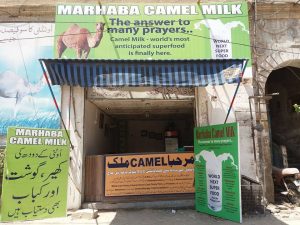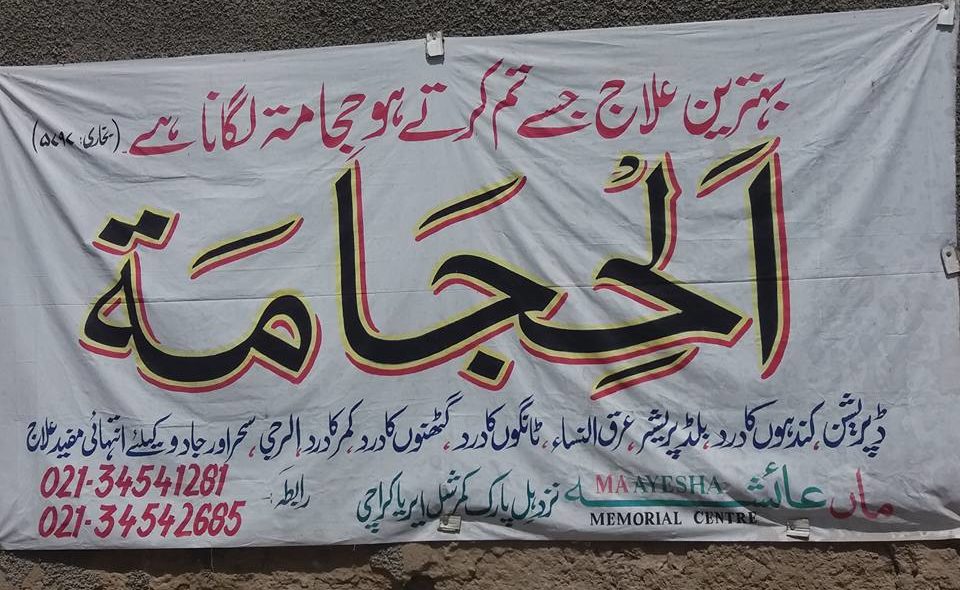Karachi: Traditional Islamic health treatments known as ‘prophetic medicine’ are experiencing a boom in Karachi, Pakistan’s largest city, despite the proliferation of modern medical facilities.
Programs are aired on TV channels and articles are published in newspapers regarding ‘prophetic medicine’, so named because of references to health cures such as camel’s millk by the Prophet Muhammad (PBUH).

In central Karachi shop owner Adnan says he sells 100 litres of camel milk per day, at Rs.400 per litre. It is supplied fresh daily.
“Most people take camel milk for medicinal purposes for treating hepatitis, hypertension and cancer, as they believe it is beneficial for them,” Adnan, who sometimes imports camel milk from Dubai, told News Lens Pakistan.
“It is not a very profitable business. We are doing it to get reward from Allah,” he said.
“Shops have opened up in many places because people have started trusting camel milk for health benefits.”
Shehryar, 34, has been consuming camel milk once a week since it brought relief to his swollen liver.
“I got treated by doctors. I underwent several tests, used expensive drugs but found no relief. Then I went to a herbalist, who advised me to try camel milk,” he added.
Muhammad Tariq, 65, uses Ajwa dates to treat his diabetes and cardiac problems.
“I heard about the benefits of the palm date on a TV channel. Now I use the powder of Ajwa date stones. I eat three dates in three days and then take a three day break,” he said. He says he is now managing to keep his blood glucose level down.
Islamic narrations regarding the Ajwa say that Prophet Muhammad planted palm trees (Ajwa) in Medina. Followers believe its dates have healing properties.
“I regularly use nigella seeds because the Quran and Hadith say it can cure every ailment. I also use powdered leaves of neem to control my blood glucose level,” diabetes sufferer Asma Fareed told News Lens Pakistan.
Psychiatrist Haroon Ahmed said TV channels promoting Islamic treatments were contributing to the growth in their popularity.
“They claim they can cure cancer and diabetes. But f someone can cure diabetes, he deserves a Nobel prize,” he said.
“The reason for the popularity of unconventional methods of healing is that conventional medical treatment can be very difficult. If you go to hospital, they will ask you to undergo a number of expensive tests. A lot of people look for a quicker fix and turn to spiritual healing. These wise men and scholars claim that complex diseases cannot be cured by conventional medicine,” Haroon said.
The Pakistan Medical Association estimates two million non-medical healers are operating in Sindh province in Pakistan’s south.
If at least 10 people visit a non-medical healer every day, nearly 20 million people are being treated by them daily. According to PMDC data, a single doctor is officially available for 825 persons in Sindh.
The practice of cupping or sucking known as ‘Hijama’ is also growing rapidly in Karachi. Some hijama clinics claims claim it can cure any disease.

Dr. Amber Mushtaq, a doctor and family medicine specialist, has been practising hijama for several years. She studied the method online.
“Hijama has proven effective for patients of diabetes, high blood pressure, back pain, migraine, depression, skin disorders, thyroid disease, stress and infertility,” she told News Lens Pakistan.
“I do not claim hijama can treat everything. If there is a patient in need of surgery or at the final stage of cancer, we recommend they go to the doctor. But if it is the first stage, we do hijama,” she said.
Dr Mushtaq said there was some initial pain when the first cup of blood was being extracted “but then it becomes bearable.”
She suggests hijama to patients because toxins stored in the body are present due to the use of conventional medicines.
“Hijama is very helpful for detoxification,” Dr Mushtaq said.
Najia, a patient at Dr. Mushtaq’s clinic, is undergoing treatment for various pains throughout her body.
“My cousin told me that this treatment is Sunnah and it is good for you,” she told News Lens Pakistan.
Some doctors believe that untrained personnel are practising hijama, thus putting their patients at risk as they may contract infections such as hepatitis and AIDS.
“Hijama can have an adverse effect if the cup is placed at the wrong part of the body. Untrained personnel can only make the patient’s condition worse, instead of curing them,” Dr Sharjeel Baloch told News Lens Pakistan.
Hijama clinics are not registered and there is no code of conduct for them.
“It does not fall under the jurisdiction of PMDC. Only medical doctors and dentists come under our jurisdiction,” PMDC spokesman Hina Shaukat told News Lens Pakistan.
Director of Health, Sindh Abdul Shakoor Abbasi said the practice increased the risk of spreading HIV-AIDS.
“We need to take action against hijama centres,” Abbasi told News Lens Pakistan, pointing out that there is no regulation of the industry.



